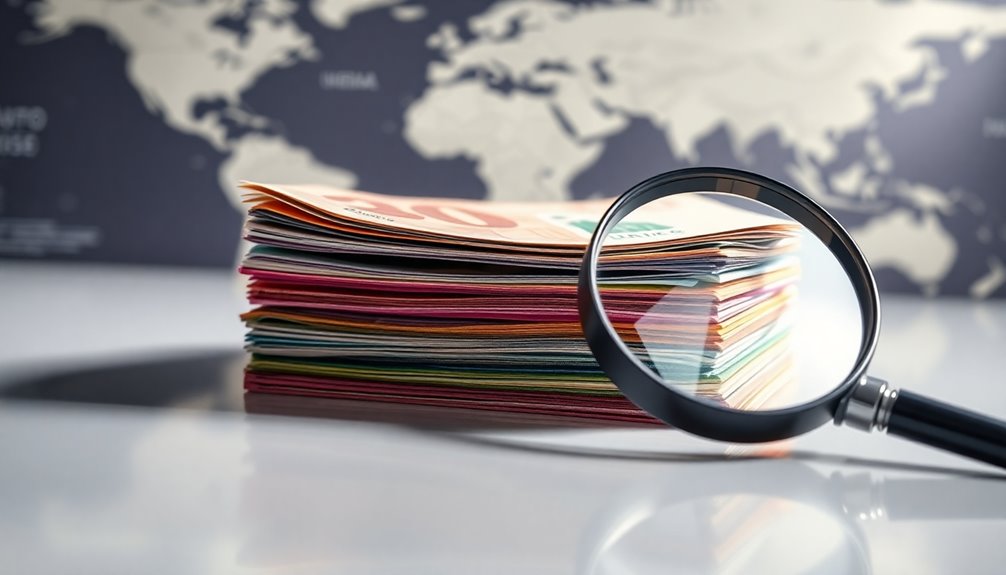The most stable currencies today are the Swiss Franc, US Dollar, and Japanese Yen. The Swiss Franc benefits from political stability and is seen as a safe haven. The US Dollar's strength comes from a robust economy and sound monetary policies. Meanwhile, the Japanese Yen acts as a refuge during times of economic uncertainty. These currencies exhibit low inflation and stable interest rates, which enhance their value. Understanding the factors behind their stability will give you deeper insights into currency dynamics and how to strategically navigate them for your investments.
Key Takeaways
- The Swiss Franc is considered one of the most stable currencies due to its political stability and safe-haven status.
- The US Dollar remains strong due to a robust economy and sound monetary policies, making it a top stable currency.
- The Japanese Yen serves as a safe haven during economic uncertainty, contributing to its stability in global markets.
- Currency stability is influenced by low inflation rates, high employment, and favorable economic performance indicators.
- Future outlook suggests the USD will maintain strength, while Asian currencies may face challenges from rising US interest rates.
Currency Stability Explained

When you think about currency stability, it's essential to consider the economic indicators that play a significant role in determining a currency's value.
GDP reflects the economy's size and growth, affecting how strong the currency is. Inflation rates, tracked by CPI and PPI, directly impact purchasing power and stability. High employment rates indicate strong demand for goods and services, further stabilizing the currency.
Interest rates set by central banks can attract investors, while a balanced trade account supports economic stability. Additionally, sound economic policies, low inflation, and a robust export sector contribute to currency strength. All these factors intertwine to create a stable environment that fosters confidence in a currency's value. Furthermore, robust economies are characterized by low unemployment and inflation, which correlates with stable currencies.
Defining Currency Stability Factors

Understanding the factors that contribute to currency stability helps you grasp how economies function.
Economic performance plays a crucial role; high GDP and robust growth signal increased demand for a nation's currency. A favorable trade balance further strengthens it. Strong GDP growth attracts foreign investment, which boosts currency demand and enhances stability.
Interest rates and monetary policy also matter; higher rates attract foreign investment, boosting currency value. Low inflation rates enhance purchasing power, making a currency more appealing to investors.
Additionally, political stability fosters confidence and long-term investments, while high employment rates indicate economic strength.
Conversely, geopolitical volatility can destabilize currency value, as can political instability leading to capital flight.
Currency Value Determination Process

The process of determining currency value hinges on various interconnected factors that reflect market dynamics. Supply and demand play a crucial role; if demand for a currency rises, it can strengthen its value, while a surplus may lead to devaluation. Economic indicators, such as inflation rates and interest rates, significantly impact this value. Low inflation typically boosts currency strength, while higher interest rates attract foreign investment. Additionally, the introduction of fiat money has shifted the focus of value determination from physical commodities to government creditworthiness. Exchange rate systems further complicate matters; fixed rates provide stability, while floating rates allow the market to dictate value. Lastly, market sentiment, driven by geopolitical conditions and economic news, can sway investor confidence, affecting demand and ultimately the currency's value. Understanding these elements is essential for grasping currency valuation.
Pros and Cons Analysis

While the Swiss Franc is often lauded for its stability, weighing the pros and cons is essential for investors and decision-makers.
On the plus side, its strong economy, low inflation, and safe-haven status make it a reliable choice, especially during global turmoil. The currency's global recognition and strong regulatory environment enhance its appeal. Additionally, the Swiss Franc benefits from a large net surplus of international investment, further solidifying its status as a stable currency.
However, there are drawbacks. The Swiss Franc offers limited growth potential, as its stability may deter speculative investments. It's also sensitive to external factors like global crises and US economic policies.
Additionally, strict monetary policies can restrict flexibility and growth, which mightn't appeal to all investors. Balancing these factors is crucial when considering the Swiss Franc for your portfolio.
Currency Stability Rankings

As global markets fluctuate, knowing which currencies rank highest in stability can significantly impact your investment decisions.
In 2023-2024, the Swiss Franc, US Dollar, and Japanese Yen lead the pack, showcasing low fluctuations and robust economic performance. The US Dollar stands out due to America's strong economy and sound monetary policies. The Swiss Franc benefits from Switzerland's political stability, while the Japanese Yen often serves as a safe haven during economic uncertainty. Additionally, the US Dollar's anticipated strength is supported by higher US rates, indicating ongoing resilience in the face of global challenges.
Looking ahead to 2025, the USD is expected to maintain its strength, with Asian currencies like the CNY facing challenges from higher US interest rates. Scandinavian currencies, such as the Norwegian Krone, may struggle amid European risks, making these rankings crucial for strategic investment planning.
Market Volatility Impacts Stability

Market volatility directly affects currency stability, impacting everything from trade to inflation. When currency fluctuations occur, they can disrupt commerce and hinder economic growth. In emerging market economies, high exchange rate volatility can increase output variability and create vulnerabilities. If you're investing or conducting business in such regions, be aware that a volatile exchange rate may lead to financial instability and significant currency mismatches. Central banks often intervene to manage this volatility, raising interest rates or providing insurance against risks. However, too much stability can create wrong incentives. Recent trends show that emerging market currencies have depreciated approximately 4% year-to-date against the US dollar, highlighting the importance of monitoring currency movements. To mitigate risks, you can use financial instruments like futures and options, while staying alert to how interest rate differentials influence market movements.
Digital Currency Innovations

Digital currency innovations are transforming the financial landscape, offering new solutions for payments and transactions.
You'll find that cryptocurrencies, being decentralized, rely on consensus and are verified through blockchain technology, ensuring security. However, their volatility limits their effectiveness as a stable store of value.
On the other hand, Central Bank Digital Currencies (CBDCs) present a centralized option that's more stable, backed by government authority and universally accepted. They integrate easily with existing systems, enhancing transaction efficiency.
Both types of digital currencies enable fast transfers, global accessibility, and offer privacy.
As you explore these innovations, consider how they're reshaping the way you think about money and transactions in our increasingly digital world.
Diversify Currency Holdings Wisely

To effectively diversify your currency holdings, it's crucial to consider a mix of factors that influence stability and growth. Focus on currencies from countries with strong economic indicators and stable political environments. Strong economic performance often attracts foreign investment, which can further enhance a currency's value. Higher interest rates can offer better growth prospects, so keep an eye on those currencies. Additionally, look into currencies tied to commodity prices for protection against inflation.
Engage in hedging strategies like forward and options contracts to manage risk, and consider geographic diversification to mitigate local downturns. A balanced mix of major, minor, and exotic currencies can optimize your market exposure. Regularly monitor your portfolio and adjust based on market trends to ensure continued stability and growth in your currency holdings.
Frequently Asked Questions
How Can I Invest in Stable Currencies Effectively?
To invest in stable currencies effectively, start by researching options like forex accounts or currency exchange services.
Consider direct investments, trading stable currency pairs like EUR/USD, or placing funds in bank deposits.
Diversifying your portfolio with stable currencies can reduce risk.
Keep an eye on economic indicators and geopolitical events to make informed decisions.
Regularly monitor central bank policies to adjust your strategies and maximize returns in a low-volatility environment.
Are Stable Currencies Immune to Inflation?
Stable currencies aren't immune to inflation—it's a myth as big as a mountain!
Even the most reliable currencies, like the US dollar or Swiss franc, can lose purchasing power over time. Central banks may hike interest rates to counter inflation, affecting the currency's value.
While stable currencies hold their ground in nominal terms, they can still falter in real terms.
Which Currencies Are Considered Stable During Global Crises?
During global crises, you'll find that currencies like the Swiss Franc and Japanese Yen are often seen as stable.
The Swiss Franc benefits from Switzerland's strong economy and political neutrality, while the Japanese Yen serves as a safe haven due to Japan's economic resilience.
You might also consider the US Dollar, which, despite some fluctuations, remains widely traded.
Lastly, the Singapore Dollar is known for its stability in turbulent times, attracting foreign investments.
How Do Geopolitical Events Affect Currency Stability?
Think of the butterfly effect—how a small change can ripple through an entire system.
Geopolitical events can shake currency stability to its core. When conflicts arise or trade disputes emerge, uncertainty reigns, and investors often flee to safer currencies.
You'll notice fluctuations as central banks react to changing tides. Ultimately, strong political climates attract investment, while instability leads to capital flight, making the currency more vulnerable and volatile.
Stay alert!
Can Stable Currencies Lose Value Suddenly?
Yes, stable currencies can lose value suddenly.
If the underlying assets they're pegged to experience significant drops, you could see a de-pegging event. Lack of transparency or mismanagement can erode your trust, leading to rapid value loss.
Additionally, algorithmic stablecoins might fail due to market shocks.
Always keep in mind that even stable currencies aren't immune to external factors and can fluctuate based on market dynamics and regulatory changes.
Conclusion
In a world where currencies dance like leaves in the wind, finding the most stable one is like discovering an anchoring rock amidst a rushing river. By understanding the factors that influence stability, you can confidently navigate the financial landscape. Remember, diversifying your currency holdings is like planting a garden—different blooms thrive in varying conditions. Embrace the journey, and let the stability of your chosen currencies shield you from the storm, guiding you to calmer waters ahead.









